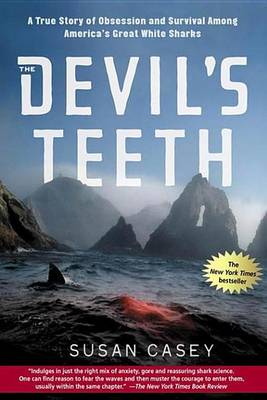Susan Casey was in her living room when she first saw the great white sharks of the Farallon Islands, their dark fins swirling around a small motorboat in a documentary. These sharks were the alphas among alphas, some longer than twenty feet, and there were too many to count; even more incredible, this congregation was taking place just twenty-seven miles off the coast of San Francisco. In a matter of months, Casey was being hoisted out of the early-winter swells on a crane, up a cliff face to the barren surface of Southeast Farallon Island - dubbed by sailors in the 1850s the "devil's teeth." There she joined Scot Anderson and Peter Pyle, the two biologists who bunk down during shark season each fall in the Island's ori:e habitable building, a haunted, 135-year-old house spackled with lichen and gull guano. Two days later, she got her first glimpse of the famous, terrifying jaws up close, and she was instantly hooked; her fascination soon yielded to obsession-and an invitation to return for a full season.
But as Casey readied herself for the eight-week stint, she had no way of preparing for what she would find among the dangerous, forgotten islands that have banished every campaign for civilization in the past two hundred years. "The Devil's Teeth" is a vivid dispatch from an otherworldly out-post, a story of crossing the boundary between society and an untamed place where humans are neither wanted nor needed. In a world where very little is known for certain, we knew that below us a great white shark was orbiting, waiting for the seal to bleed some more, and that this shark would soon be returning for breakfast. It might be Betty or Mama or the Gadillac, one of the huge females that patrolled the east side of the island. These big girls, all of them over 18 feet long, were known as the sisterhood. Or it might be a "smaller" male (say, 14 or 15 feet) like Two Spot or T-Nose or the sneaky Gal Ripfin. These sharks were called the rat pack. It might be any number of great whites.
At this time of the year there were scores of them cruising this 120-acre patch of sea, swimming close to the shoreline of Southeast Farallon Island as hapless seals washed out of finger gulleys at high tide and into the danger zone. In any given year more than a thousand people will be maimed by toilet bowl cleaning products or killed by cattle. Less than a dozen will be attacked by a great white shark. In this neighbourhood, however, odds do not count. At the Farallon Islands in autumn, your chance of meeting a great white face-to-face is better than even money, should you be crazy enough or unlucky enough to end up in the water.
- ISBN10 1466800518
- ISBN13 9781466800519
- Publish Date 30 May 2006 (first published 3 May 2005)
- Publish Status Active
- Imprint Henry Holt & Company
- Format eBook
- Language English
